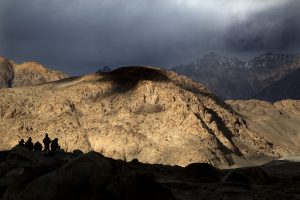Editor’s Note: The following is a preview of the latest edition of the APAC Risk Newsletter, presented by Diplomat Risk Intelligence. To read the full newsletter, click here to subscribe for free.
Between October 20, 1975 and June 15, 2020, no Indian or Chinese troops died along the two countries’ disputed border. That changed on June 15, when 20 Indians and an unknown number of Chinese soldiers were killed in a brawl. In recent days, the situation has heated up again, with another reported Indian casualty, ending a 76-day period without any deaths. As Ajai Shukla reported recently, Nyima Tenzin of India’s Special Frontier Force (SFF), an elite border unit, was killed in a shadowy operation.
The tactical situation around Pangong Tso—one of the many simmering standoff points along the Line of Actual Control in Eastern Ladakh—has changed following Indian moves in recent days. Indian forces have assumed control of the heights on the southern bank of the lake, apparently catching the PLA off-guard and drawing protest from China.
As Bloomberg reports, citing Indian officials, “In what they called India’s first offensive move since the conflict began in May, thousands of soldiers climbed up mountain peaks for about six hours to claim the vantage points along the south bank of Pangong Tso—a glacial lake roughly the size of Singapore.”
“The action was taken to counter what India saw an intrusion by Chinese forces, the officials said, asking not to be identified due to rules on speaking to the media.” According to Times of India, the Indian Army has also consolidated positions on the north bank, overlooking the first and second “Fingers” (mountainous outcroppings) at the lake.
Elsewhere at The Diplomat, Abhijnan Rej, our new security and defense editor, takes a look at the recent operations and the increased stakes in Ladakh. “Indian actions early this week mark a turning point in the ongoing crisis,” he observes. To many, much of what has happened in Eastern Ladakh over the past four months reminds one of the events leading up to the 1999 India-Pakistan Kargil War, but in slow motion—and with added complexity. For India, the PLA is a better equipped adversary than Pakistan in 1999, of course, and New Delhi still has to contend with shortfalls in equipment, even while its own manpower is quite favorable along the Himalayan border.
For now, the India-China border remains incredibly tense. We may be in for a long, bitter winter as Indian and Chinese troops attempt to preserve their gains in Ladakh while talks continue at the diplomatic and military levels.
Editor’s Note: The following is a preview of the latest edition of the APAC Risk Newsletter, presented by Diplomat Risk Intelligence. To read the full newsletter, click here to subscribe for free.

































